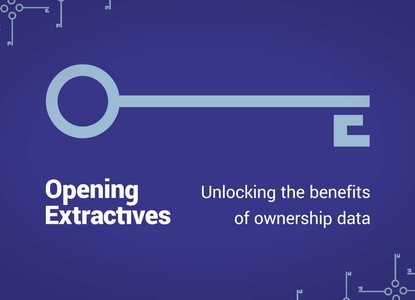Who benefits? Harnessing company ownership data to reduce corruption

The Zambian government is currently strengthening its disclosure system with support from Opening Extractives.
What do six wind farms in Argentina, a waste pit in Ukraine, and a golf course in the United Kingdom have in common? Each has been connected to a case of alleged corruption. In all these cases, data from government registers of beneficial ownership has helped answer a critical question: who stands to benefit.
These cases and others are covered in a new policy brief published as part of the Opening Extractives Programme titled Who benefits? How company ownership data is used to detect and prevent corruption. It demonstrates the potential of company ownership data to challenge those seeking to abuse their positions for personal gain, by illustrating three ways in which data on beneficial ownership is being used in jurisdictions around the world to prevent and detect corruption.
1. Investigating corruption, following the money
Anonymously owned companies can present a dead end in corruption investigations. Company ownership information provides a critical piece of the puzzle to help financial investigative units, law enforcement and journalists follow the money. In many cases, these inquiries involve tracing transactions from bank account to bank account to link financial flows to individuals. They are testing novel, data-driven approaches to this work, such as the use of online tools that combine datasets like the Organised Crime and Corruption Reporting Project’s Aleph platform.
Case in point: Zambia’s Financial Intelligence Centre (FIC) consults the country’s beneficial ownership register on a daily basis as a matter of standard practice, launched in 2019. Along with shareholder and director information, beneficial ownership declarations provide an extra dimension for identifying links between individuals and entities, which generates leads and helps FIC analysts know the full scope of an investigation. Although the FIC conducts their own verification of information, they welcome efforts to improve the accuracy of information on the register, as this will likely save them time – a precious asset in investigations.
2. Reducing corruption risks through informed decision-making
Each day, governments and businesses make decisions about how to allocate resources, who to do business with and where not to invest. Access to information on real company owners can raise red flags that escape more superficial checks, resulting in procurement, licensing, and company due diligence decisions that are better informed by visibility of potential risks. Using the data in decision-making has the added benefit of helping identify fraud. For example, Nigeria’s Mining Cadastre Office has significantly increased its revenue by using beneficial ownership data to screen licence applications for individuals with previously unpaid service fees.
Case in point: The business development team for an international mining equipment manufacturer operating in Zambia routinely used beneficial ownership information to perform customer due diligence on artisanal mining companies seeking to purchase equipment, including checks for potential corruption. The manufacturer denied quotes to companies in cases where it discovered data that shareholders and beneficial owners were politically affiliated. This was grounds to immediately cease business. They also denied quotes when there were signs of shell companies being used.

Peer learning delivered through the Opening Extractives programme is supporting beneficial ownership transparency in Nigeria.
3. Analysing data to deliver anti-corruption insights and impact
Analyses using beneficial ownership data can improve understanding of patterns and behaviours that may point to corrupt practices. Such analyses offer new insights into how corrupt actors navigate and exploit financial and economic systems. Policy actors can also use the data they hold to help understand the effectiveness of disclosure regimes in supporting anti-corruption aims. For example, Scottish Limited Partnerships (SLPs) were not required to disclose to the UK register when it was established in 2016. Subsequent analysis showed the number of new SLPs almost doubled in the year after the register’s launch, and investigations showed that the legal entity type had been used for money laundering. The government brought them within the scope of beneficial ownership transparency rules in 2017.
Case in point: Transparency International UK recently used analysis of bulk data on the ownership of UK Limited Liability Partnerships to generate recommendations for the UK Government to strengthen their approach to anti-money laundering. These included calls to increase the role of Companies House in ensuring data accuracy and verifying proof of identity. The analysis looked at more than 50 corruption and money laundering cases representing approximately USD 730 billion in suspicious transactions to identify characteristics that point to LLPs’ potential abuse for serious financial crime; these include the presence of specific patterns in beneficial ownership information.

EITI multi-stakeholder group in Ukraine discusses the importance of the verification of data in the public register.
What’s next? Increasing beneficial ownership data use in addressing corruption
Governments and civil society recognise the importance of transparency of the individuals who ultimately own and benefit from companies to tackle political corruption and kleptocracy. In resource rich countries, rooting out corruption in the extractive sector can help address some of the most pressing imperatives, from domestic resource mobilisation to national security. Promoting the wider use of beneficial ownership data and enabling innovation is the next step in the path towards fully unlocking the potential impact of this area of reform. To make this happen, anti-corruption actors should work together to implement five recommendations:
● Build registers that meet users needs: Over 120 jurisdictions have committed to reforms for better visibility of company ownership, including through EITI membership, yet fewer than half of these have implemented their commitments. To unlock the full potential of beneficial ownership data to counter corruption, it is necessary to bridge the implementation gap and for governments to prioritise effective implementation.
● Raise awareness and capacity for data use: A potential obstacle to scaling up the use of data is a lack of understanding and sensitisation to beneficial ownership transparency. Governments and civil society should raise public awareness and build the capacity of financial investigative units, law enforcement, businesses, and journalists to use the data.
● Invest in innovation: The private sector, journalists, and civil society are experimenting with connecting beneficial ownership information with other data sources to generate new insights, tools, and red flagging mechanisms to detect and prevent corruption. More support is needed for these innovative organisations, projects, and individuals.
● Embed the use of data into existing and new processes: Scaling the use of beneficial ownership data means it should be embedded into existing processes. The data should be used in processes such as due diligence and risk management and harnessed to embed transparency into priority policy areas such as the energy transition.
● Build sustainability into reforms: A key concern for many countries is how to fund reforms and meet the ongoing costs of maintaining a central beneficial ownership register. Donors and international organisations can provide seed funding for registers, along with supporting research and fostering peer exchanges to generate new learning in this area. Governments can prioritise creating structured data that allows for automation.

